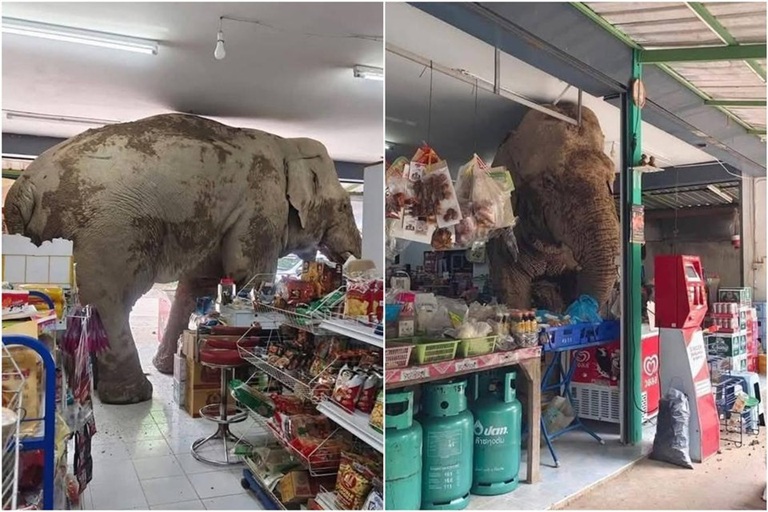In a scene straight out of a jungle adventure film, a wild elephant recently caused quite a stir in Thailand when it wandered into a small grocery store, rummaging through snacks, fruits, and other items with its trunk. The unusual and alarming incident unfolded on Monday, June 2, 2025, in Nakhon Ratchasima province, near Khao Yai National Park, where residents watched in awe and disbelief as the massive creature helped itself to food items typically reserved for human customers.
The Incident
The event took place in the afternoon, when the owner of the grocery store, Khamploy Gakaew, had closed the premises but was still in the vicinity. Surveillance footage shows the elephant, known locally as Plai Biang Lek, using its trunk to skillfully open the front door before reaching in and knocking over shelves. It reportedly devoured nine bags of sweet rice crackers, several bananas, and at least one sandwich before ambling away into the darkness .
While no one was injured during the encounter, the damage to the store was substantial. Several shelves were knocked down, and goods were either crushed or stolen—by the trunk, that is.
The store’s owner expressed both shock and resignation. “This isn’t the first time elephants have wandered close to the village,” she said, “but it’s the first time one has entered my store. I didn’t know whether to laugh or cry.”
Elephants and Expanding Human Habitats
Thailand is home to over 4,000 wild elephants, primarily living in protected national parks and forest reserves. However, the growing conflict between humans and wildlife is becoming more apparent as urban expansion and agricultural encroachment continue to shrink natural elephant habitats .
As forests are cleared for rubber plantations, infrastructure projects, and human settlements, elephants are increasingly forced to seek food in villages and towns. Experts say this change in behavior is part of a growing trend across several Southeast Asian countries.
“Elephants are highly intelligent and adaptive animals,” notes Dr. Somchai Thepparat, a wildlife ecologist at Chiang Mai University. “They quickly learn where food is stored and may return if they find easy access. Unfortunately, this adaptability can bring them into direct conflict with people.”
Not an Isolated Case
This isn’t the first such incident in Thailand. In fact, similar events have occurred in recent years, especially in regions bordering forested areas. In 2023, Plai Biang Lek was spotted raiding a restaurant while the owners were asleep .
In some cases, elephants have even caused road accidents or broken into local farms, trampling crops and damaging property. Thai authorities have acknowledged the growing frequency of such encounters and are working on preventive measures.
Government and Conservation Efforts
The Thai Department of National Parks, Wildlife and Plant Conservation (DNP) has launched multiple initiatives to reduce human-elephant conflict. These include building elephant corridors to allow safe movement between forest areas, installing electric fences, and conducting community awareness programs.
“People need to be educated about living near wildlife zones,” said a DNP spokesperson. “Prevention and understanding are key. These animals are not villains; they are simply trying to survive.”
Several conservation groups are also calling for stricter land-use policies and reforestation efforts to restore elephant habitats. In the meantime, local villagers are encouraged to report elephant sightings and avoid engaging or provoking the animals.
A Viral Moment, But With Deeper Implications
Though the footage of the elephant's grocery raid has garnered millions of views online and sparked humorous memes, wildlife experts caution against trivializing such encounters. What may seem amusing at first glance is a serious indicator of environmental imbalance and inadequate wildlife protection.
“These viral moments must lead to serious conversations,” says Dr. Thepparat. “It’s not about whether the elephant was cute or clever—it’s about what drove it into that store in the first place.”
Conclusion
The “trunkful of trouble” incident may be the latest example of a curious elephant on a late-night snack run, but it also underscores an urgent environmental challenge. As the lines between human civilization and wild habitats continue to blur, these interactions are only likely to increase unless sustainable solutions are put in place.
Thailand now faces a dual challenge: protecting its human population from property damage and danger, while also safeguarding the majestic animals that are so deeply woven into its cultural and natural heritage. The elephant’s grocery run should serve not just as comic relief—but as a wake-up call.
